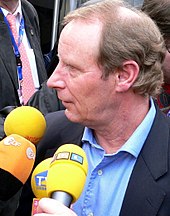
Franz Anton Beckenbauer was a German professional football player, manager, and official. Nicknamed der Kaiser, he is widely regarded as one of the greatest players of all time, and is one of nine players to have won the FIFA World Cup, the European Champions Cup, and the Ballon d'Or. Beckenbauer was a versatile player who started out as a midfielder, but made his name as a central defender. He is often credited as having invented the role of the modern sweeper.
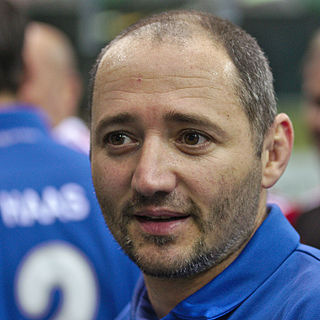
Oliver Patric Neuville is a German former footballer who played as a striker.
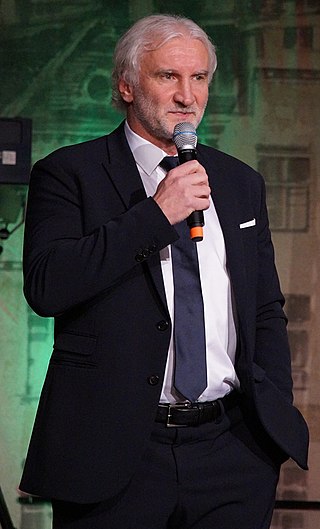
Rudolf "Rudi" Völler is a German professional football manager and former player, who is currently the director of the Germany national team. In Germany, he is nicknamed "Tante Käthe", a name bestowed upon him by Thomas Berthold, and in Italy, he is nicknamed "Il tedesco volante" by supporters of Roma.

Michael Ballack is a German former professional footballer. He was selected by Pelé as one of FIFA's 100 Greatest Living Players, and as the UEFA Club Midfielder of the Year in 2002. He won the German Footballer of the Year award three times – in 2002, 2003 and 2005. Ballack was known for his passing range, powerful shot, physical strength and commanding presence in midfield.

Patrik Jonas Andersson is a Swedish former professional footballer who played as a defender.

Günter Theodor Netzer is a German former professional football player, executive and pundit. He achieved great success in Germany with Borussia Mönchengladbach in the early 1970s and, after moving to Spain in 1973, with Real Madrid. A technically gifted playmaker, Netzer played as an attacking midfielder or as a deep-lying playmaker and is considered one of the greatest passers in the game's history. He was voted German Footballer of the Year twice, in 1972 and 1973.
Stefan Effenberg is a German former footballer who most recently acted as sporting director for KFC Uerdingen 05. A midfielder, he was known for his leadership skills, passing range, shooting ability, and physical strength, but was also a temperamental and controversial character.

Thomas Jürgen "Icke" Häßler is a German former professional footballer. He played as a midfielder throughout his career. At club level, he made a century of appearances for four teams: 1. FC Köln, Karlsruher SC and 1860 Munich in Germany and Roma in Italy, and spent a season apiece with Juventus, Borussia Dortmund and SV Salzburg. Häßler also appeared over 100 times for the Germany national team.

Andreas Möller is a German former professional footballer who played as an attacking midfielder. He is the head of the youth department at Eintracht Frankfurt.

Rainer Bonhof is a German former professional footballer, who played as a defensive midfielder or wing-back. He was known for his occasional bursts upfield and his fierce shot. He was a key player for the 1974 West Germany national team that won the World Cup. Bonhof was one of the stars for his club side, Borussia Mönchengladbach, and won numerous domestic league and cup titles.

Udo Lattek was a German professional football player and coach.

Jens Daniel Nowotny is a German former professional footballer who played as a defender.
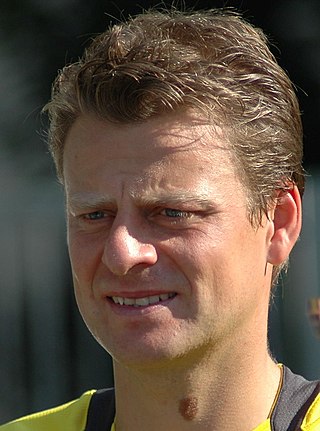
Christian Wörns is a German former professional footballer who played as a defender. Wörns is widely considered one of the finest German defenders of his generation. He started his career with Waldhof Mannheim but played the majority of his career with Bayer Leverkusen and Borussia Dortmund. He also had a short stint with Paris Saint-Germain.

Josef "Jupp" Heynckes is a German retired professional footballer and manager. For the majority of his playing career he was as a striker for Borussia Mönchengladbach in its golden era of the 1960s and '70s, when they won many national championships and the DFB-Pokal, as well as the UEFA Cup. During this period the team played in its only European Cup final in 1977, losing to Liverpool. He is the fourth-highest goalscorer in the history of the Bundesliga, with 220 goals. He was a member of the West Germany national team that won the UEFA Euro 1972 and the 1974 FIFA World Cup titles.
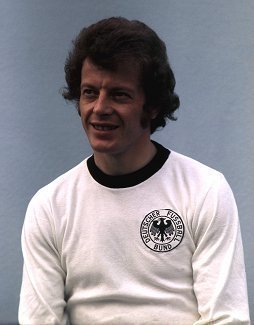
Herbert "Hacki" Wimmer is a German former professional footballer who played as a midfielder. Besides winning five national championships and two UEFA Cups with his club side Borussia Mönchengladbach, he won the 1974 World Cup and the UEFA Euro 1972 with Germany.

Bernd Schneider is a German former professional footballer. He was mainly a midfielder but could play anywhere on the left and right flanks. After retiring in June 2009, he took up an advisory role at his first club, Carl Zeiss Jena, and a scouting position at Bayer Leverkusen.
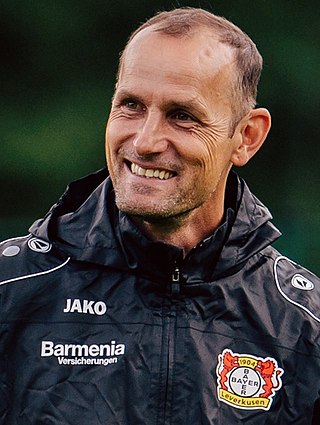
Heiko Herrlich is a German football manager and former player who played as a striker.

Horst-Dieter Höttges was a German professional footballer who played as a sweeper or right-back. Having started his career with hometown club Borussia Mönchengladbach, he spent most of his career with Werder Bremen. He made 420 Bundesliga appearances for Werder Bremen, a club record for outfield players, scoring 55 goals and helped the club win the Bundesliga title in the 1964–65 season, his first at Werder Bremen. At international level, he represented West Germany from 1965 to 1974, amassing 66 caps and scoring 1 goal. He was part of the West Germany squads that won the 1974 FIFA World Cup and the UEFA Euro 1972.

Wolfgang Rolff is a German football manager and former player.
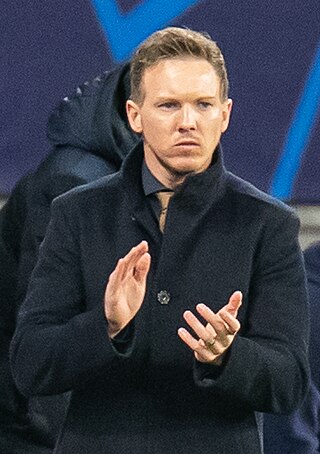
The Germany national football team manager is a position created in 1926 and first held by Otto Nerz. The German team began playing matches in 1908, but for 18 years it had no manager. Instead a selection committee chose the team.


